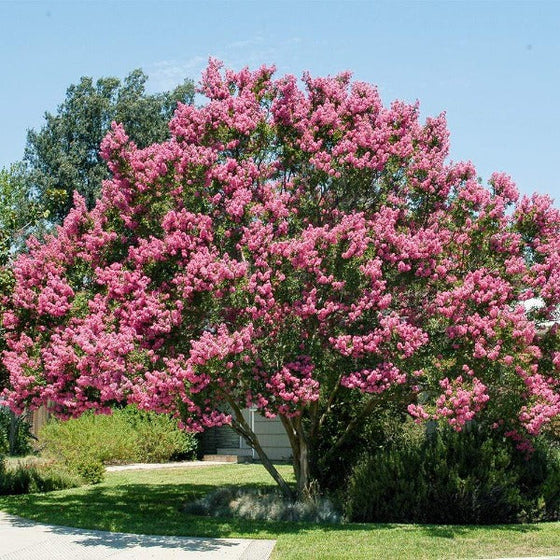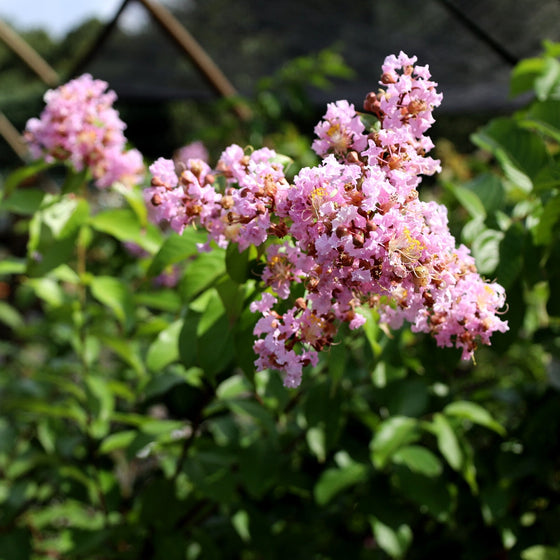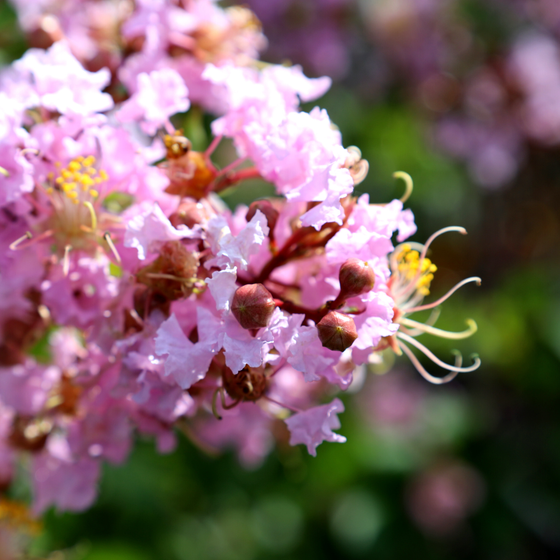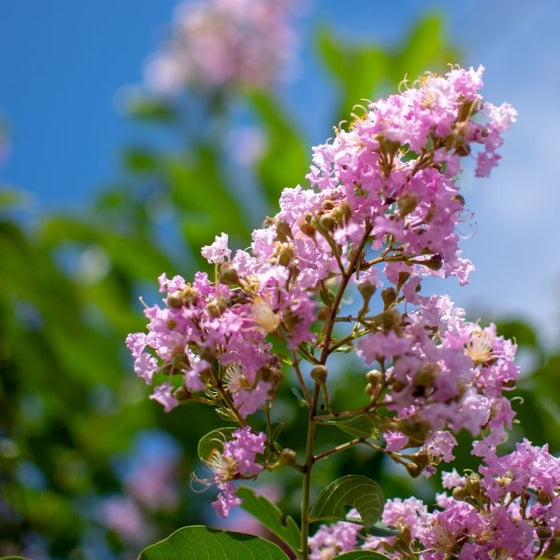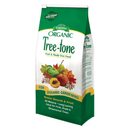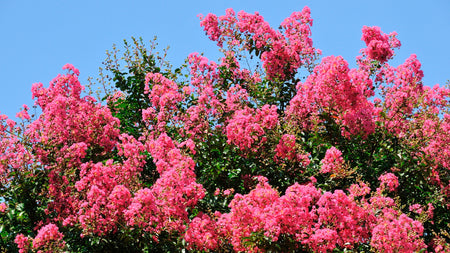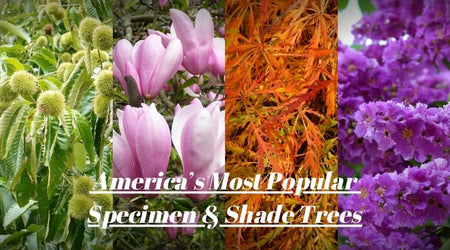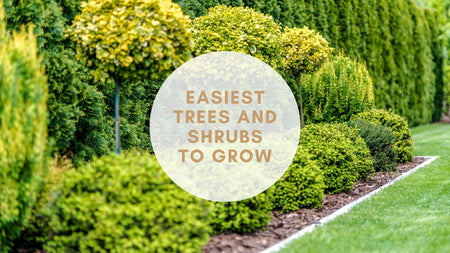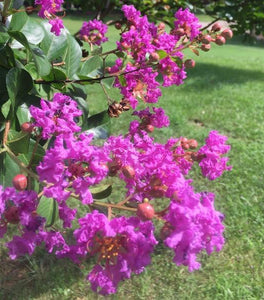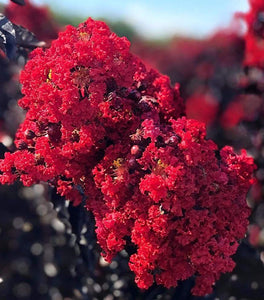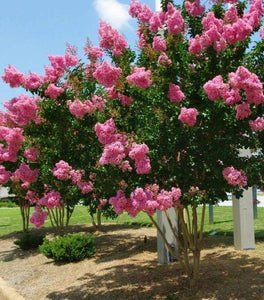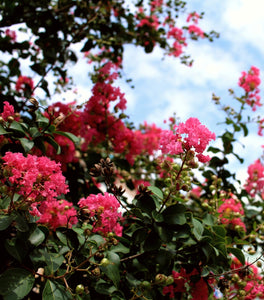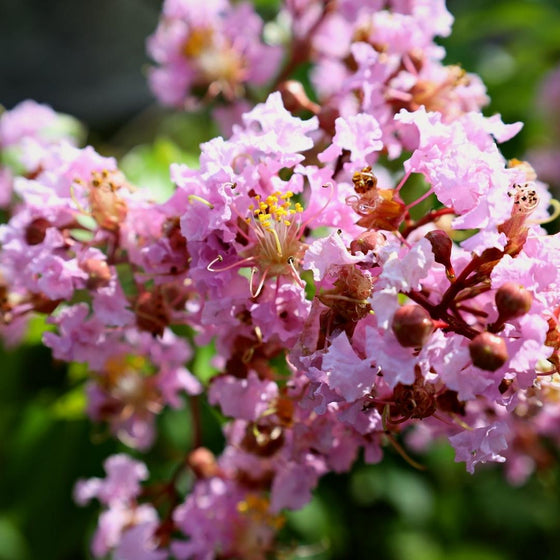
Images Depict Mature Plants
Muskogee Crape Myrtle – Fast-Growing Lavender Flowering Tree with Long Bloom Season
The long-blooming beauty of southern landscapes.
The Muskogee Crape Myrtle is a classic flowering tree celebrated for its lavender-pink blossoms, smooth cinnamon bark, and impressive bloom duration of up to 120 days. Perfect for adding color and structure to large gardens, driveways, or property borders, this hybrid variety (Lagerstroemia indica × fauriei) is both fast-growing and disease-resistant. Its graceful canopy and profuse summer flowers make it one of the most popular Crape Myrtles for homeowners across the South and Mid-Atlantic.
A fast-growing shade and flowering tree.
Reaching heights of 20 to 25 feet and widths of 15 to 20 feet, the Muskogee Crape Myrtle provides quick-growing privacy and seasonal shade without the high maintenance of traditional trees. Its upright, vase-shaped form creates a strong vertical accent, while its soft lavender blooms provide color from midsummer through early fall. Whether planted as a standalone specimen, a pair flanking your driveway, or a row along property lines, Muskogee adds elegance, texture, and charm to any sunny space.
Reliable performance and exceptional resilience.
Developed by the U.S. National Arboretum, Muskogee is known for its resistance to powdery mildew and its ability to thrive in hot, humid climates. Once established, it becomes highly drought-tolerant, making it ideal for low-maintenance landscapes. The hybrid parentage of Lagerstroemia indica and fauriei gives it superior vigor, smooth bark, and improved cold hardiness — perfect for gardeners in Zones 7–9.
Color that lasts all summer long.
Few flowering trees can match the Muskogee’s bloom longevity, low maintenance, and year-round beauty. In summer, enjoy waves of lavender flowers; in fall, its foliage transitions to a rich bronze hue; and in winter, the peeling bark adds subtle ornamental interest. If you’re seeking a fast-growing, long-lasting flowering tree, Muskogee is a proven southern favorite that delivers decades of color and character.
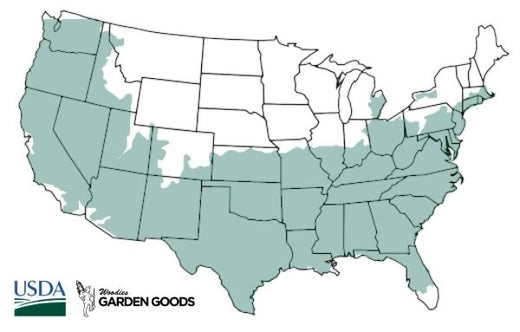
| Hardiness Zone: | 6-9 |
|---|---|
| Mature Height: | 20 to 25 feet |
| Mature Width: | 15 to 20 feet |
| Classification: | Tree form |
| Sunlight: | Full sun |
| Habit: | Deciduous, densely branched, multi-stemmed summer through the first frost |
| Flower Color: | Soft lavender pink flowers in mid to late summer through the first frost |
| Foliage: | New growth emerges a rich dark green, changing to an equally vibrant orange-red in the fall |
| Soil Condition: | Any well drained soil |
| Water Requirements: | Water well until established |
| Uses: | Extremely attractive when used as a focal point in the mixed border, mass planting, or a specimen planting . Small enough for a large containers on the patio |
How to Care for Muskogee Crape Myrtle
Before you buy a Muskogee Crape Myrtle tree, make sure to read about the care instructions that are required and recommended to keep this plant healthy and thriving.
How do I plant a Muskogee Crape Myrtle tree?
Plant your Muskogee Crape Myrtle in a sunny location with at least six hours of direct sunlight per day. Dig a hole twice as wide as the root ball but no deeper, so the root flare remains at soil level. Backfill with native soil mixed with compost for drainage, then water deeply after planting. Add a 2–3 inch layer of mulch to retain moisture and prevent weeds. Avoid low areas where water collects, as Crape Myrtles prefer well-drained soil. When planting multiple trees for a privacy line or driveway border, space them 12–15 feet apart to allow proper airflow and growth.
How often should I water my Muskogee Crape Myrtle?
During the first year, water deeply once or twice per week, depending on weather conditions. After establishment, Muskogee becomes highly drought tolerant and only needs occasional watering during prolonged dry spells. Always water at the base of the plant to avoid wetting the foliage, which helps prevent mildew. In hot climates, mulch around the root zone to conserve moisture and keep the soil temperature stable.
When should I fertilize my Muskogee Crape Myrtle?
Fertilize in early spring, just before new growth begins, using a balanced slow-release fertilizer such as 10-10-10. A second, lighter feeding in midsummer encourages lush blooms and strong growth. Avoid excessive fertilization, which can promote leaf growth at the expense of flowers. Incorporating compost or organic matter annually also supports soil health and moisture retention, giving your Muskogee the nutrients it needs to bloom beautifully each year.

How and when should I prune a Muskogee Crape Myrtle?
Prune your Muskogee Crape Myrtle in late winter or early spring before new growth emerges. Focus on removing crossing, dead, or crowded branches, and shape lightly for a balanced form. Avoid heavy “topping” cuts — this can lead to weak branches and fewer blooms. Because Muskogee blooms on new wood, pruning helps encourage vigorous growth and more flower clusters. Proper pruning maintains its upright shape and enhances the smooth, sculptural bark for winter interest.

